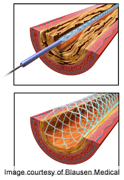
THURSDAY, Sept. 20 (HealthDay News) — A full year of aggressive anti-clotting therapy — which can lead to heavy bleeding — may not be needed after surgery to implant a drug-coated cardiac stent, two new studies suggest.
Standard treatment for patients receiving so-called drug-eluting cardiac stents, which prop open clogged arteries after angioplasty, typically entails 12 months of double anti-platelet therapy consisting of aspirin and prescription blood thinners. Korean and Spanish research indicates, however, that patients who discontinue such risky therapy after several months suffer no more ill effects than those treated for a year.
“The interesting thing is, we went through a period of time so panicked about anti-platelet therapy interruptions and the effect they might have,” said Dr. Kirk Garratt, director of clinical research at Lenox Hill Heart and Vascular Institute of New York City, who was not involved in the studies. “But over the last few years, a series of reports and clinical trials say the same thing — that we probably don’t need to be as worked up about it as we used to be.”
The studies are scheduled for publication Sept. 21 in the Journal of the American College of Cardiology.
Cardiac stents — metal mesh tubes that prevent heart arteries from re-closing — are implanted in more than 500,000 Americans each year, according to the U.S. Centers for Disease Control and Prevention. Some stents are coated with slowly released medication to prevent the growth of scar tissue in the artery lining.
Prescription blood thinners used in double anti-platelet therapy, such as clopidogrel (Plavix) and warfarin (Coumadin), are tricky to dose properly and can lead to life-threatening bleeding complications.
The Korean study split more than 2,100 patients, all of whom underwent stent surgery after angina (chest pain) or a heart attack, into groups treated with either three months of double anti-platelet therapy or the standard 12-month course. After a year, just less than 5 percent of both groups had suffered complications such as death, bleeding, heart attack or clotting near the stent.
The Spanish study addressed interruptions in double anti-platelet therapy due to noncompliance, surgery or other medical decisions in a group of 1,600 patients. Most of the 10.6 percent of patients who discontinued the therapy did so temporarily, but this practice didn’t translate into more serious consequences compared to those whose therapy was not interrupted.
“The big takeaway is that neither of these studies fundamentally change the way I think about these therapies for my patients,” Garratt said. “But the Spanish study increases my confidence in the way I’m managing these patients.”
But Dr. Christopher Cove, associate professor of medicine and assistant director of the cardiac catheterization lab at University of Rochester Medical Center in New York, cautioned it would be a mistake to think it’s safe to stop double anti-platelet therapy based on the new research. Larger studies are needed, he added.
“We know that [double anti-platelet therapy] is beneficial as compared to aspirin alone in large groups of patients, and that there’s a high risk of bleeding with it,” Cove said. “What we really need to know is, if we have to stop double anti-platelet therapy, when is the safe time to do that.”
More information
The American Heart Association has more about angioplasty and stents.

